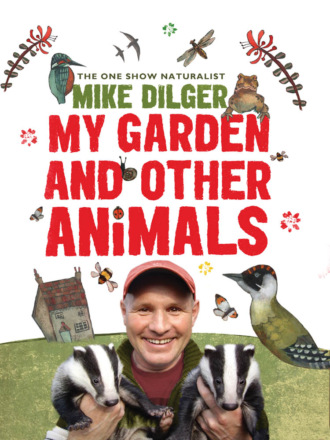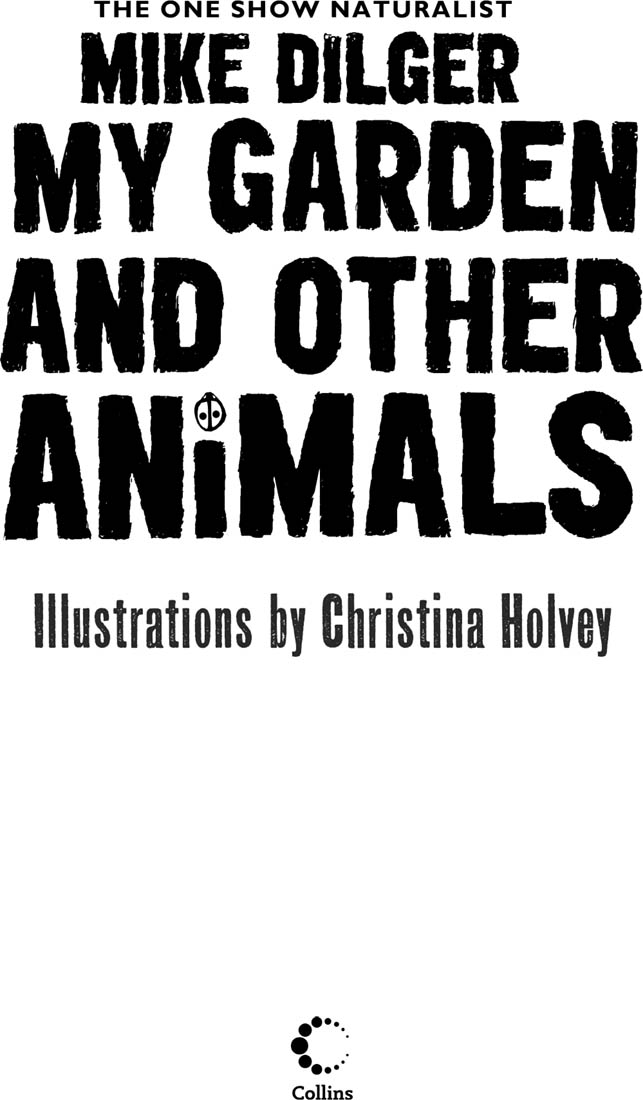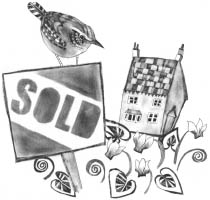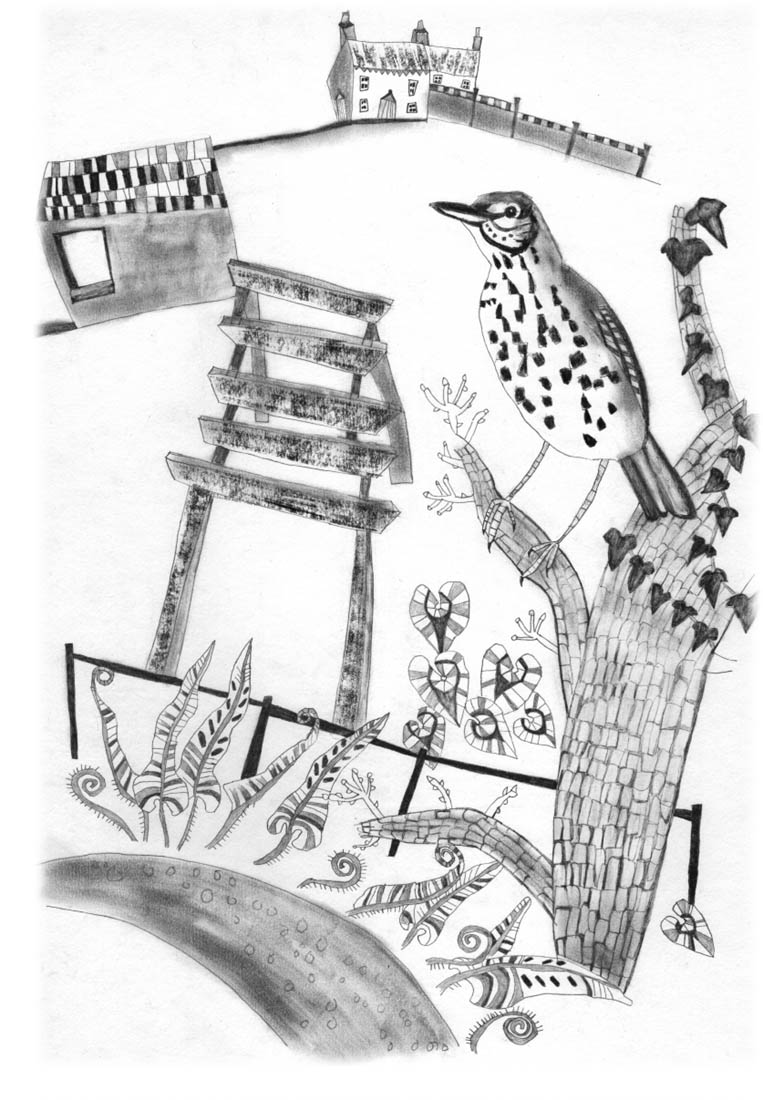
Полная версия
My Garden and Other Animals


To the three women in my life:
Christina, Mum and Hilary
CONTENTS
Cover
Title Page
Dedication
JANUARY – The Move
FEBRUARY – Settling In and Knuckling Down
MARCH – Springing into Action
APRIL – If You Dig It, They Will Come
MAY – More Wildlife than You Can Shake a Stick At
JUNE – Who Says Moths Are Boring?
JULY – Birds, Bats and Bugs by the Bucket-load
AUGUST – The Sun-seekers Take Centre Stage
SEPTEMBER – Harvesting the Fruits of our Labours
OCTOBER – Departures, Arrivals and Residents
NOVEMBER AND DECEMBER – The Temperature Drops but the Action Hots Up
JANUARY – A Box, within a Box, within a Garden
Acknowledgements
About the Author
Copyright
About the Publisher

JANUARY
THE MOVE
‘Potential’ was definitely the word that sprang to mind the first time I clapped eyes on our new ‘house-and-garden-to-be’ in the small rural village of Chew Stoke, eight miles south of Bristol. On my partner Christina’s first viewing, the adjectives that sprung to her mind were ‘dilapidated’, ‘overpriced’ and ‘abandoned’. True, the unprepossessing semi we had just purchased was an ex-council property, hastily built in 1956 to house those displaced by the flooding of 1,200 acres of farmland that would ultimately form the Chew Valley Lake Reservoir. The house had also been sitting empty for the best part of a year, often not one of the best of signs. Don’t get me wrong, the property was more than habitable and according to our surveyor had been solidly built and was structurally sound, so at least it would be dry and warm. It was also a house perfectly designed with the phrase ‘bog-standard’ in mind, and certainly wouldn’t be the recipient of any architectural prizes.
From the outside the pebble-dashed facade smeared over concrete-block walls bore more than a passing resemblance to the colour of boiled shite; and with a combination of pine-panelling, hideously dated wallpaper and marigold-coloured walls, the interior offered little improvement. Even though the house was of cheap construction and stuck in a 1970s time warp, we had always declared this to be of little concern, as the real reason behind making the huge financial leap of faith had been the bell-bottom-jeans-shaped garden at the rear.
Surrounded on either side by mature gardens and playing fields, and book-ended with a small wooded bank leading to a stream that also represented the northern boundary of the property, the garden, whilst currently tired, unkempt and unloved, might just be in a position to offer huge promise under the right stewardship.
Along one of the boundaries – which divided the garden from an adjacent playing field – a small peeled-up section of fence and digging-marks in the lawn were a sign of the active presence of badgers. Surely, too, the stream might just play host to passing kingfishers, and the mini-woodland would certainly act as the perfect wildlife corridor for the comings and goings of everything from grey squirrels to great tits. Who wouldn’t bet on deer, foxes and woodpeckers making an appearance at some point too?
On our second viewing, endless possibilities as to how I could turn the garden into that mini nature reserve I yearned for began to run through my mind. My mouth followed suit, as I attempted to convince Christina of the simple, fun tasks we would be able to undertake to make the garden even more attractive to wildlife. ‘The bottom of the garden is where we should create the meadow, the pond would be next to the garage, we could then remove the alien species from the wooded bank and place the bug hotel in a quiet corner …’ I breathlessly declared in a soliloquy that would have left Hamlet short of a few words. Building up a head of steam, and getting even more carried away, I further stated that if we were successful in purchasing the property, I would personally take in hand the task of re-designing and re-wilding the garden, while maybe Christina could be persuaded to take on the slightly less glamorous task of redeveloping the house …
Now I hate to characterise our relationship as that of a ‘building-castles-in-the-sky’ type pitted against a cautious pragmatist, but broadly speaking it’s true. So I was in no position to argue when Christina put down a few conditions as to how the division of labour would work even IF we were to make an offer.
While on one hand she thought it churlish to ride roughshod over my naive optimism, she also felt compelled to point out the uncomfortable truth that I was not exactly the most practical of people, and so would have to give serious thought as to whether I would have the technical ‘know-how’ to carry out such ambitious plans. Not helping my argument was my track record; in my old communal garden in Bristol I had always tended to be a little work-shy when it came to any hard graft, and my ‘share’ of the gardening chores had usually consisted of little more than filling the bird-feeders. In response, I assured her in no uncertain terms that this time it would be different.
Feeling like I was winning the argument, I also offered an additional sweetener by suggesting that I would of course seek advice immediately if I felt out of my depth and promised I wouldn’t attempt anything foolhardy. Still unsure as to whom I was trying most to convince – her or myself – Christina suddenly and uncharacteristically threw caution to the wind, catching me totally off guard, by boldly stating that we should put in an offer without further ado! I could have kissed her … and in fact I did!

If anyone has ever tried to buy and sell property simultaneously they will understand why moving home is apparently right on the heels of death and divorce in that infamous list of ‘the most stressful things in life’. Once our offer was accepted the purchase moved through at double-quick time and moving day quickly followed.
It’s quite humbling seeing your worldly possessions – which have taken the best part of four decades to accumulate – reduced to a pile of cardboard boxes. This meant that Bill and his removal boys made short work of the flat’s contents, as I watched my dwelling of the last ten years reduced to an empty shell in just a couple of hours. Stopping only briefly to help themselves to more tea and the last of the biscuits, they hopped in the van and headed for our new home, leaving Christina and me behind to take the opportunity to say goodbye to a flat that had treated us to so many happy memories, but which we had now also undoubtedly outgrown. Without looking back, we closed the front door on our old lives and headed off to the vendors’ estate agents in Chew Stoke for our prize of two small keys, purchased for the mind-boggling sum of £220,000.
We arrived at our new house just a couple of minutes after the removals lorry had pulled up on the drive – our drive. The ever-practical Christina proceeded to open up the house and take the lads on a guided tour, pointing out which boxes were to be deposited where, which gave me the chance to excuse myself from the hustle and bustle for just a moment so that I could take in the garden through an entirely new set of eyes. This time it was OUR garden!
Passing through the crude, asbestos-covered outhouse adjoining the kitchen at the back of the property and out of the back door, the functional concrete patio funnelled down to a nondescript path, bisecting a lawn which had definitely seen better days. Dotted randomly around the lawn were a couple of long-neglected rose-standards, a sickly collection of random shrubs which had been planted in all the wrong places (and in the wrong soil type), two different-sized birch trees, two rowan trees positioned far too close together for either to flourish, and a majestic if slightly lop-sided beech tree. The centre of the garden featured a huge and monumentally ugly wooden pergola that had been built in the form of an archway and which quite possibly could have been the only other man-made structure, apart from the Great Wall of China, viewable from outer space.
As I took in the view from the patio, our patio, the left-hand boundary was split between next door’s mature garden, with the further half running adjacent to a council playing field consisting of a goal post and a small playground for infants. Following down the right-hand side, the small creaky and rusting garden gate, which gave access to the drive at the side of the house, was attached to a short breeze-block wall, which in turn was adjoined to a great, hulking garage, shared with our neighbours. Finally, at the rear of the garage a panelled fence delineated the boundary between our property and that of next door’s, giving our garden privacy if nothing else.
Pacing down the garden, the lawn ran in a fairly regimented fashion for some 25 yards in a northwesterly direction, increasing in width from the patio (or hips) down to a tree-covered shady bank (or the ankles), revealing at its base the aforementioned water feature poking out of the bottom of the flares like a pair of grubby feet. From our very first visit, I had envisaged the water course, with the remarkably unprepossessing name of Strode Brook, as the ace in our deck of wildlife cards. Our section of the brook happened to join our property at the head of a large meander, meaning that the water met the garden at an angle before caressing the bank for a 10-yard stretch and retreating away again at a tangent. Inside the bend on the opposite bank was an area that looked like it was attached to a much larger and formal garden, but apart from a carefully mown strip that had been cut to allow access down to the brook, the rest of the land had obviously been left to glorious abandonment – making it great for nature.
In addition to the more formal part of the garden, the bank on our side was in desperate need of attention. Being on the outer bend of the meander, the constant water flow had acted like a huge corrosive brillo pad, and had seriously undercut the bank to such an extent that the small, steep section closest to the playing field looked decidedly unstable. Additionally, the adjacent and much shallower middle section had previously been used as a dumping ground for garden waste, giving the bank more the look of a rubbish dump than a wooded glade.
Dominating the air space above the bank were a sickly-looking and ivy-festooned oak, whose exposed roots crudely protruded out of the steep bank in the precipitous northwesterly corner, and a 60-foot-tall flagpole-straight ash in the centre. Both of these trees were surrounded by overgrown rank hazels and hawthorns, which hadn’t been touched for decades, and as a result had run amok in the understory, making an already dark north-facing slope look a Tolkienesque mini-Mirkwood. To put it bluntly, it was hard to see the wood for the trees!
The wooded bank and brook were partitioned off from the rest of the garden by a 3-foot-high wooden fence, covered in chicken wire, meaning any entry to the wood could only be achieved via a straddle at the height which tends to be awkward for males. Apparently the reason for this fence lay in the fact that the house had belonged to a very senior gentleman by the name of Mr Gregory, who had lived and raised a family here for the best part of 50 years until he was removed against his will, but for his own safety, into an old folks’ home nearby. Once an extremely keen gardener, in his latter years he suffered dementia but was still prone to impromptu walkabouts. During one of his mini-excursions down to the river, Mr Gregory had apparently accidentally uncovered a wasps’ nest, resulting in him being stung numerous times before tumbling down the bank and into the brook. Unable to haul himself out, apparently Mr Gregory had lain dazed and confused in the water for several hours until his faint cries for help were heard by neighbours.

As I wandered around the garden, with my chest puffed out and a heady mixture of excitement and trepidation welling up, little seemed to have changed since our last viewing, but in other ways everything had changed – the garden was now our responsibility! Contemplating the gravitas of what we had just taken on, my mood was instantly lightened as I spotted the first basal rosettes of primroses, pushing their way up exactly where I had planned the meadow to be! In little more than a month, their flowers would be providing the first boost of nectar for any emerging queen bumblebees that had successfully navigated the perils of hibernation.
As I got to my feet, one of those unforgettable red-letter moments suddenly occurred as a bird began to sing – my first thrush song in 2011. To make the moment even more special, it was not only being sung by my favourite songbird, but the individual in question had decided to belt out its mellifluous, strident and instantly recognisable song from the top of the oak tree, our oak tree, making it our song thrush!

When comparing birdsong, many say the nightingale is the finest songster in Britain, but I reckon in full swing the song thrush gives it a damn good run for its money. It’s difficult to explain with mere words the astonishing complexity, beauty and power of the song thrush’s song. Consisting of over a 100 exquisite, different musical phrases, each is repeated three or four times before the thrush draws breath in prelude to belting out another. It’s as though the gaps in between each phrase have evolved to give the song thrush a second to retrospectively admire his artistry. If so, he wasn’t the only one. As I stood there, listening to the virtuoso performance, it sounded like the bird was actually serenading me with a welcome song. The song thrush’s timing was impeccable, birdsong had never sounded sweeter and, more importantly, it made me feel that everything would be all right.

Landing back on Planet Earth with a bump and suddenly painfully aware as to how much had to be done, I wandered back in to find Bill, the Bristolian born and bred removals gaffer, espousing his philosophy to Christina on everything from Formula 1 to the finer points of interior decoration. Despite his West Country chatter constantly reverberating around the bare walls of the house, giving the impression that there was rather more tea drinking going on than what we were actually paying them to do, both Bill and his two henchmen, Derek and, yes, Derek, made light work of unloading the van. Having distributed all the boxes, they paused only briefly to have one more round of tea and biscuits and receive their all-important tip for a job well done before hands were shaken and they were off, leaving us and our boxes to a new life in the country.
The thing that instantly hit me, as I watched the removals van disappear from view, was the sound of silence – I could hear nothing. No trains or planes, no ambulances, no road-drills – nothing. It was a far cry from my old flat in central Bristol where the constant background hum of the city had been something I had taken for granted for far too long. Undoubtedly a townie born and bred, this would be my first attempt at living in the country. It would also be the first ever house I had lived in where I would be able to lie in bed and listen to the sounds of the dawn chorus. How exciting would that be?!
My hypnotic trance of imagining how wonderful it would be to listen to blackcaps before breakfast was suddenly broken by the sight and sound of another van outside trying its best to squeeze past my hurriedly parked car on the pavement. It was only then that I realised in our rush to open up for the removals guys that we had partially blocked the entrance to next door’s drive, and the owners of the other half of our semi. Not a good start. Dashing out to both apologise profusely and greet in one fell swoop, I offered the hand of friendship to my new neighbour, a wiry chap in his late forties called Andy, for whom an apology was deemed totally unnecessary and who seemed delighted that the other half of his property would finally be occupied. With big, bucket hands the texture of sandpaper, Andy was patently not someone who whiled away his professional life shuffling papers behind a desk; this was a man with a van, a man with technical ability and therefore someone worth cultivating a friendship with!
Despite being someone who crops up on telly on a regular basis to talk about everything from bumblebees to basking sharks, I’m often genuinely surprised when people recognise me. I suppose it’s because I forget that people will make the connection between the similarity of the chap appearing on the goggle-box and the person in the flesh. And while it’s very rarely an unpleasant experience when people want to meet you purely because you make regular appearances in the corner of their sitting rooms, it is a feeling, that unless you’re Paul McCartney or David Beckham, you never really get used to. So adopting my usual tactic of quickly changing the subject from his opening gambit of ‘I saw you on the telly last week’, I was quickly able to find out that not only was Andy a married man with three kids but also jointly ran a small plumbing business – handy indeed!
Apparently our arrival had been the talk of the street for the last couple of weeks, and whether this was down to my minor celebrity status or because anyone moving into a cul-de-sac in a small rural village would get the same level of scrutiny, I wasn’t sure. After pleasantries were exchanged, and as Andy patently seemed aware of my wildlife pedigree, he immediately implored me to come and see his garden, with which we shared a boundary for some 15 yards, so he could show me the array of feeders he had installed at various locations. Being a practical fellow, he had built a couple of lovely bespoke wooden feeding tables, rather than choosing the Dilger Way, which is usually to part with the cash at an inflated price instead.
It being a cold, wintery day, the local bird community was indeed piling in to his refuelling stations, and even without my trusty binoculars, in the matter of just a couple of minutes I was able to point out the usual cast of characters including great tit, blue tit, chaffinch, robin and dunnock. What I didn’t expect, though, was to see the tell-tale flashing white outer tail feathers of an altogether more unusual garden bird coming down to Andy’s offerings.
‘Reed bunting!’ I suddenly blurted out like a Tourette’s Syndrome sufferer, crudely cutting right across the middle of an entirely different discussion about the impressive amount of building work Andy had done to their house. To be fair, Andy also genuinely seemed thrilled by this find, declaring that he had never seen one before, and for me, back once again on the more comfortable subject of garden bird ecology rather than the intricacies of building regulations, I was able to give Andy a brief, impromptu lecture on the life history of the reed bunting.
Seemingly interested in my intricate knowledge of the bird’s ecology, and warming to the theme, Andy pointed out where they fed the local fox and then showed me another wildlife feature in their garden, which up until that point I hadn’t even noticed. Nestling behind an ugly leylandii and no more than two yards from our communal fence I was delighted to be shown a pond that Andy’s wife Lorraine, who apparently adores frogs, had cajoled her husband into digging back in 2007. Despite the feature looking like it needed a clear-out, as I could barely see any standing water for plants, Andy informed me, with immense pride, that both he and Lorraine regularly came down with a cuppa to watch both frogs and newts surfacing for a gulp of air before disappearing back down below to carry on with their aquatic shenanigans.
The reason for my delight at this news was twofold. Firstly it was wonderful that we had neighbours who were singing from the same song-sheet as us, in being keen to embrace the wildlife coming into their garden, rather than doing their level best to shut it out in favour of a sterile and – in my opinion – utterly soulless garden. Secondly, enticing frogs and newts into both our garden and the pond I would be creating later would surely be much easier if they only needed to travel a matter of a few yards across herbaceous border, rather than risk the perilous journey across acres of concrete and decking under the watchful eye of any number of predators.
Thanking Andy for the impromptu tour, and having had my offer of a glass of wine over the next couple of weeks accepted, I took my leave with the perfectly reasonable excuse that I had a house to unpack and shouldn’t be giving Christina the impression that I was purposefully shirking my box-emptying duties. I barely had one foot through the door when I heard a small voice behind me. Marjory, as her name turned out, was our neighbour on the other side, and the lady with whom we had joint custody over the drive, although we didn’t have a wall in common. Looking, to be honest, a touch unwell, Marjory must have been in her early fifties and was married to a chap called Dennis, who wouldn’t be popping out to say hello as he was unwell and vulnerable to the sharp winter chill. It turned out that Marjory was also fighting her own battles with illness and was not keen to linger too long on the doorstep either, so she offered a brief but warm welcome to the street.
I prepared to attack the boxes with gusto, but only after one vital task was carried out. I had to get my priorities right and so immediately put up a couple of my feeders from my old flat into our new garden – we wanted reed buntings too!
As the day-to-day living essentials slowly began to be unpacked we at last began to make some progress in turning the house from a warehouse into some kind of home. Concentrating on the kitchen, so that we would at least be able to eat, and the bedroom, so that we could at least sleep, pots were placed in bare cupboards, cutlery located in empty drawers and the bed reassembled before being made. Pausing only for a cup of tea, poured out of the newly located teapot, our conversation was cut short by a knock at the door.
Having arrived back from work, Andy’s wife Lorraine’s curiosity had obviously got the better of her as she decided that meeting her new neighbours was something that couldn’t wait until the following day. Talking in a thick Bristolian accent, which I have come to adore since moving to this part of the world, this blonde, super-slim mum of three was someone for whom talking was obviously a passion – what a chatterbox! In no time at all, we were all getting on like we had been friends for years, and very kindly she had no qualms in instantly offering her husband’s services on hearing our most pressing domestic concern as to why we had no water coming out of any of the hot taps.
With hungry adolescents to feed next door, Lorraine bid us goodnight, and barely had we closed the door when the third neighbour of the day came knocking, also keen to welcome us to the street. Pausing only briefly to contemplate the difference between our warm reception in Chew Stoke and the decidedly chillier welcome I had received on purchasing my previous flat in Bristol, when it had taken weeks for my neighbours just to acknowledge my existence, I invited Stuart in to find a seat amongst the boxes. Stuart, it has to be said, was someone I already knew well, as until recently he had been a TV editor. Hailing from the West Midlands town of Stafford, I had always felt a kindred spirit with Stuart’s Black Country roots and especially after we had discovered during one previous discourse on football that we must have coincidentally been at a number of the same Wolverhampton Wanderers matches as kids.



